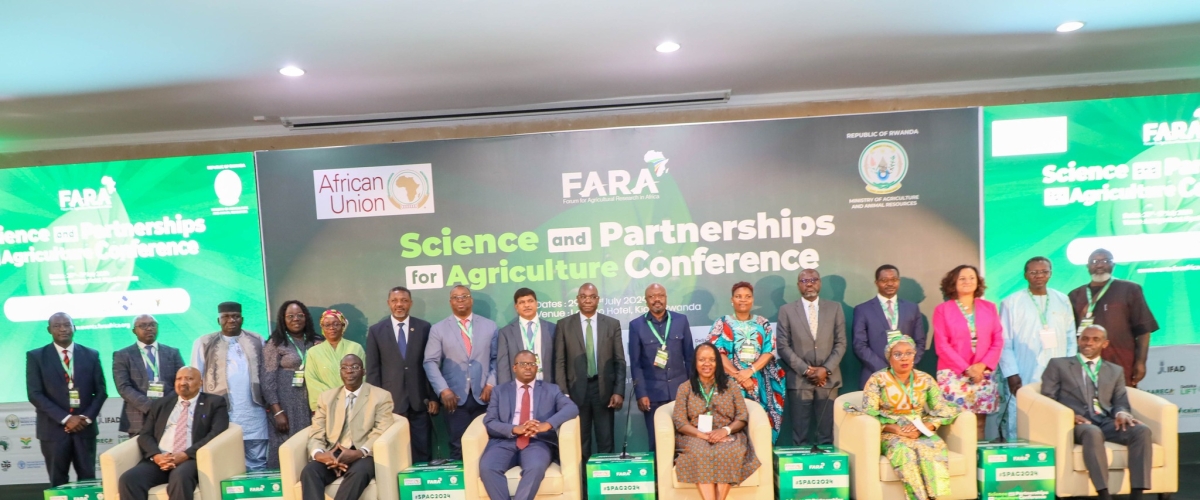
CCARDESA participated in the 2024 Science and Partnership for Agriculture Conference (SPAC) in Kigali from July 29 to 31. It was a significant event, encompassing six sub-conferences, meetings, and several side events. This year's conference brought together experts, policymakers, and stakeholders to discuss and address crucial issues in agriculture, climate change, and sustainable development.
The conference commenced with a powerful message of unity and urgency to tackle African agriculture's diverse challenges. Dr. Aggrey Agumya, Executive Director of the Forum for Agricultural Research in Africa (FARA), set the tone by welcoming delegates and highlighting critical issues such as agroecology, soil health, drought, and inclusivity. "Agriculture requires partnerships across all domains," he emphasized, noting the importance of the post-Malabo CAADP Agenda and the growing involvement of the Gen-Z generation in agricultural innovation.
Ms. Bongiwe Njobe, Chair of the FARA Board, commended Rwanda's leadership in meeting the Malabo Declaration goals. "Rwanda is leading the way in strengthening knowledge management and dissemination," she noted. Dr Njobe also addressed the issue of accountability in agricultural leadership. "The Malabo Declaration is a tool to ensure political accountability." She wondered about the poor performance of African countries in achieving the Malabo targets and wondered whether the challenges lie with politicians or professional technocrats. The Board Chair urged public leaders to guide policymakers and uphold professional standards.
The 2024 SPAC underscored the importance of leadership, collaboration, and innovation in addressing the challenges and opportunities in African agriculture, setting a clear agenda for the future. The SPAC included the third Biennial Africa CSA Conference, the 2024 KM4AgD conference, a workshop on enhancing science-policy linkages, a workshop on scaling and future scenarios, the DeSIRA Connect Days for Eastern and Southern Africa to take stock of the results and lessons from DeSIRA projects in the said regions, and an expert meeting to flesh out the Climate Change component of the Soil Initiative for Africa.
Speakers at the conference discussed sustainable practices and innovative solutions in a high-level plenary on financing agriculture. One notable session featured the Director General of the International Centre of Insect Physiology and Ecology (ICIPE), Dr Abdou Tenkouano, who presented on the use of insects in food production, textile manufacturing, and organic waste management. "In Kenya, we've reached 10% animal feed with insect-based protein," he shared, highlighting these innovations' environmental benefits and nutritional value.
CAADP-XP4 Programme Coordinator Dr. Baitsi Podisi spoke on the importance of promoting agroecology, stressing the need for comprehensive education to demonstrate its benefits. 'We need to standardize approaches to avoid confusing smallholder farmers,' he stated. Dr. Podisi emphasized the importance of building on Indigenous knowledge and innovations suitable for the environment, ensuring these practices are economically, politically, and socially acceptable. He also stressed the need to educate policymakers on the benefits of agroecology through policy briefs and other tools. 'Promoting seed systems and utilizing crops from agroecological settings can incentivize farmers,' he said, advocating for a gradual transition from current farming systems to prevent resistance and encourage adoption.
The West and Central African Council for Agricultural Research and Development) (CORAF) Executive Director Dr. Alioune Fall called for urgent transformation across all levels of African agriculture. "Africa needs to be the world's food basket," he declared, stressing the importance of resilience in food systems. He praised the collaborative efforts at the Knowledge Management for Agricultural Development (KM4AgD) Conference. He expressed gratitude for having been part of this initiative and looked forward to mainstreaming the knowledge gained.
Mr. Benjamin Abugri of KM4AgD stressed the importance of investing in knowledge management, including Indigenous knowledge. Dr Kwaku Antwi of FARA also indicated that government subsidies need to be better targeted and called for harmonized trade policies across the continent.
In his closing remarks, Dr. Telephose Ndabamenye, Director General of Rwanda's Agricultural Board, emphasized the importance of integrating Indigenous and scientific knowledge. "Youths are the legacy of accelerating agriculture," he said, urging policymakers to create smart, results-oriented policies. He stressed the need for capacity building among the younger generation for a smooth agricultural transition. He also emphasized the importance of self-sufficiency, encouraging participants to "grow our food, grow our timber, and use local products."
Dr. Aggrey Agumya advised on developing concrete, actionable steps from SPAC. He concluded by acknowledging the participation of over 300 attendees from 51 countries, including 41% women. "This week, we witnessed the power of collaboration and shared vision," he remarked, calling for continued accountability and impact in all future initiatives.
CCARDESA participated in the SPAC and organized an Agroecology side event under the support of the CAADP-XP4 Programme funded by the European Union and administered by the International Fund for Agricultural Development (IFAD). CCARDESA supported the participation of some members of the national agricultural research and extension system from the SADC region.





